reseach
Considering practical wisdom for the future from food that supports our daily life
Noriko Yuzawa, Professor
Department of Sustainability Studies, Faculty of Sustainability Studies
Posted Jan.19,2024
Professor Yuzawa’s research interests include the economic history of local communities and daily life, and the history of industrial activities and people’s lives. One of the themes that she focuses on is food. From food, which is essential for human life, we can see connections to all fields of research, including gender and urban issues, economics, history, and literature.
“Taking snacking in Japan and the U.S. for example, you can see the history of solidarity among women across borders in women’s liberation movements of the 19th and 20th centuries. The interesting thing about the research on everyday life is that you can gain comprehensive knowledge through food.”
“When you study food, sometimes you discover surprising facts as well as the ingenuity of our predecessors. I would be very happy if I could share such findings with others so that they will become more interested in their own daily lives,” said Professor Yuzawa.
Food is an inseparable part of our lives. Various research on food will provide us with many hints to envision a future in which everyone can live comfortably.
Can you tell us how you started your research and what you are currently working on?
My current research includes the economic history of local communities and daily life, and the history of industrial activities and people’s lives. I have continued my research to uncover the history of the lives of ordinary people. My research originates from geography. A friend of mine in high school who loved to travel taught me how interesting geography was, so I majored in geography in university. However, geography surprisingly does not reveal the activities of the people who live in each area. So I sought my own style of geography in which people appear, starting from the perspective of women. From there, I expanded my research focus to include women and families that support local industries, food that is essential for people to live, and the “excretion” that accompanies it.
What does research on food reveal?
Food is like the linchpin that holds the blades of a fan together. Like fan blades, the fields of study spread out from food to gender and urban issues, economics, history, literature, and so on. This is probably because food is fundamental to human survival. I recently released a book entitled “Yaki-imo and Donuts: The Secret History of Sisterhood Exchange between Japan and the United States.” In this book, I explained the roles of two typical snacks from Japan and the U.S.—yaki-imo (roasted sweet potato) and donuts—and their historical changes. When I shed light on a trivial matter like snacking, which is one of our everyday life routines, I came to know the history of solidarity among women across borders in the women’s liberation movements of the 19th and 20th centuries. As you can see, the interesting thing about research on everyday life is that you can gain comprehensive knowledge through food.
Past research on food
-
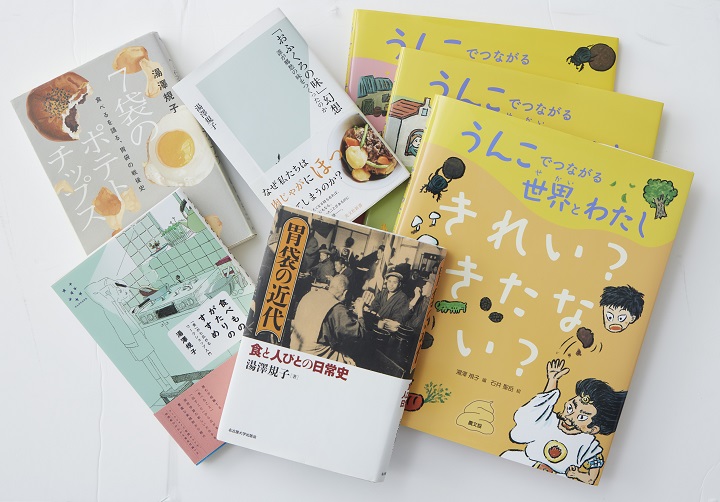
She has authored numerous books related to food including the picture book series “The World and Me Connected Through Poo” to teach children issues such as the natural environment and gender through poo; “Seven Bags of Potato Chips: A Postwar History of Stomachs that Tells the Story of Eating,” which reveals the history of food in Japan before, during, and after World War II through testimonies and documents; and “Illusion of Mom’s Cooking: Who Created the Taste of Nostalgia?” which explores the origins of unidentified “tastes.”
-
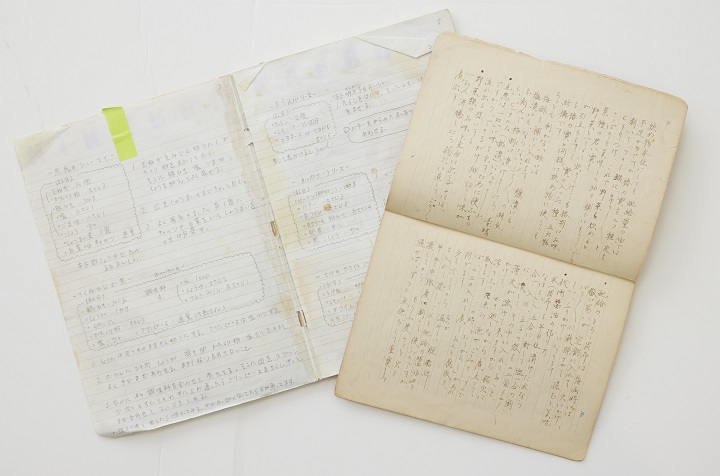
The “wartime cooking book” written by Dr. Yuzawa’s grandmother during the war, and recipes created by Dr. Yuzawa in her childhood. The “wartime cooking book” was entrusted to Dr. Yuzawa by her grandmother before her death, who thought it might be useful in some way. It contains menus that use whole vegetables, including the peel and leaves, and tips when rationed supplies are insufficient. For Dr. Yuzawa, this is an important book which can be said to be the origin of her research on food.
Does people’s awareness toward food change with the times?
In the book “The Modern Age of the Stomach,” I delved into what and how people ate and satisfied their hunger. In the past, food was provided by nature and could not be produced by humans. They worked together to hunt and gather, and shared the harvest to fill their stomachs. In other words, the stomach was a social entity that was part of the relationship between nature and humans, as well as the relationships between humans themselves. This has changed in recent years, as individuals have easy access to food as long as they have money, and the stomach has lost this social characteristic. However, in the wake of the earthquake and coronavirus pandemic, the importance of food has been reconsidered, and I think the tendency to be considerate of each other's stomachs is returning. I like the word “tabegoshirae” (preparing food to eat) by writer Michiko Ishimure. Cherishing food created by diverse regions, nature, and cultures. I believe this is what embracing diversity is all about, and it will lead to sustainability.
What is the message you want to convey to students and people through food?
The word “education” is translated in Japanese as “kyoiku,” or teaching and nurturing. But originally, it is not the teacher who is the one who takes the initiative, but the learner, and it means bringing out one's inner abilities. Following this approach, practical wisdom to proactively acquire knowledge becomes important. I always instruct students to move their mind, body, and brain in that order, but I want to incorporate a space for food like a kitchen into their education as a mechanism to move their mind. From that experience, I hope students will feel that food, which is familiar to them, can lead to a wide range of knowledge. In addition, the study of food may reveal surprising facts as well as the ingenuity of our predecessors. My hope is that by sharing these findings with others, each person will become interested in their own daily lives.
Eating space where people can interact with each other
(1)Children’s cafeteria
The children's cafeteria where Dr. Yuzawa helps out. It is a buffet style cafeteria where children pick and choose their favorite dishes. Some food ingredients are donated, and the children can learn where the donations came from. Even if some children don't like vegetables, they can still enjoy the food served at the children's cafeteria.
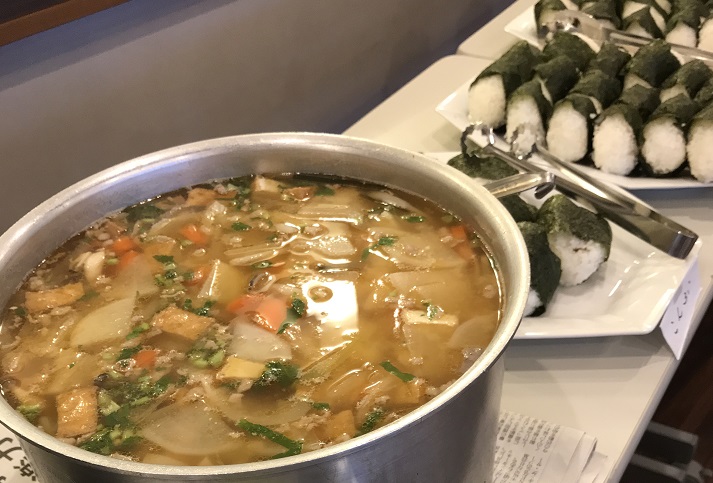
(2)Seminar summer camp
A photo taken in the summer of 2022, when students visited a vineyard in Katsunuma, Yamanashi Prefecture as part of their seminar fieldwork. Seeing the place where food is produced is an important experience for learning. The students themselves plan the fieldwork for the seminar and decide where they will go.
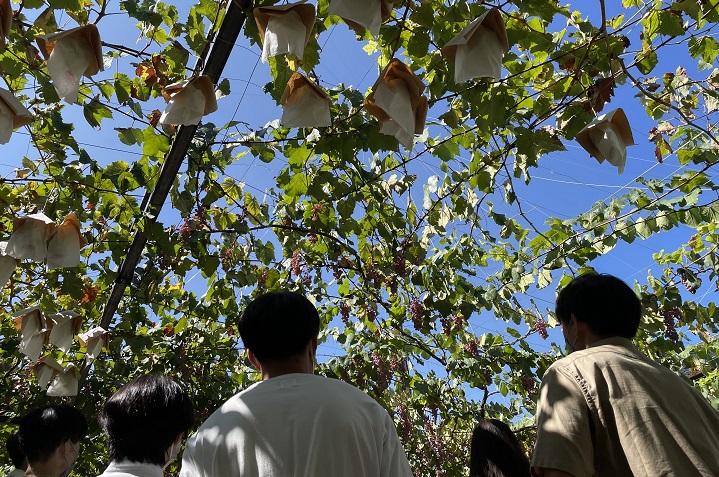
(3)Fieldwork in Laos
Lunch provided during a trip to Laos in the summer of 2023 to study changes in living conditions due to economic growth. The photo shows freshly steamed khao niao (glutinous rice) and fish caught in the village. The village they visited is blessed with abundant water, and rice cultivation is thriving. Herbs and wild plants are harvested on village grounds or at home farms, so the distance between the ingredients and the dining table is very close. They have a relaxing time using firewood and charcoal for cooking.
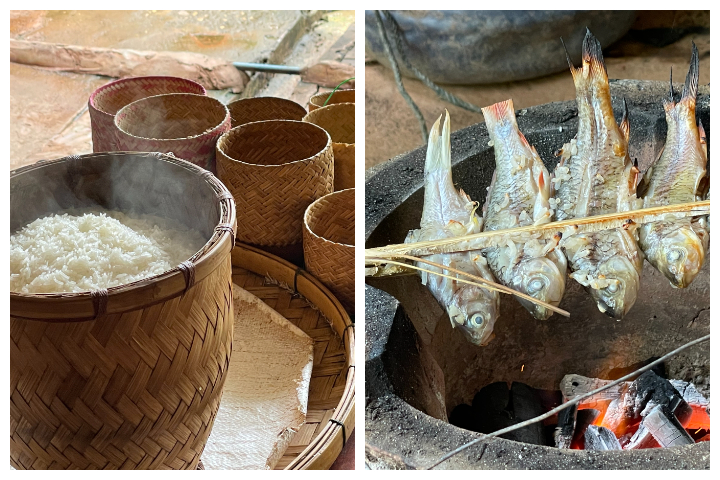
Realize Future Dream through Research
In helping out at the children's cafeteria, I feel that the relationship between food and society is becoming more important than ever before. Children’s cafeterias provide multifunctional eating spaces that not only provide meals, but also serve as a place for exchange, solidarity, and education. In Japan, as the number of single-person households increases, diverse eating spaces such as public kitchens and home delivery services will become more prevalent in the future. Through my research, I want to create a foundation that will allow us to flexibly accept such a situation.
Noriko Yuzawa, Professor
Department of Sustainability Studies, Faculty of Sustainability Studies
Completed the course of study without a degree at the Graduate School of History and Anthropology, University of Tsukuba. Doctor (Literature). Her specialties include human geography, regional economics, rural sociology, regional history and industrial history. After serving as a full-time lecturer at the School of Business Administration at Meiji University and Associate Professor at the School of Life and Environmental Sciences of the University of Tsukuba, she assumed her current position in 2019. While conducting fieldwork and other research activities, she authored a wide range of books and lectured on the theme of food.

